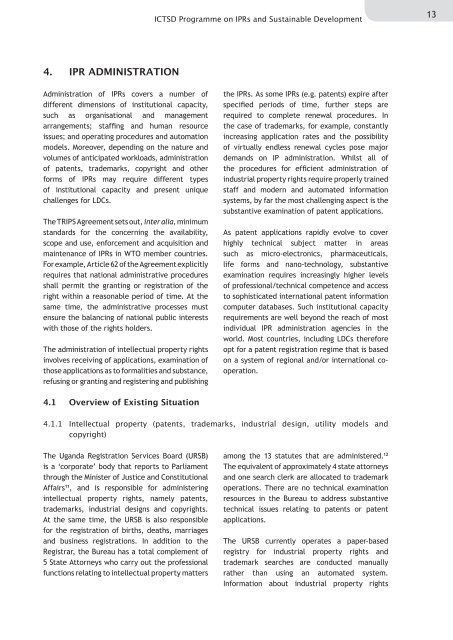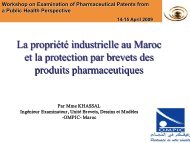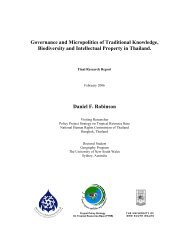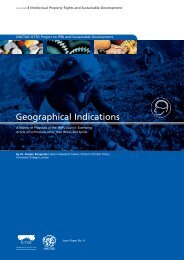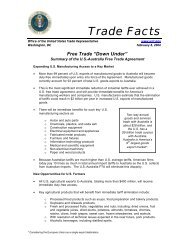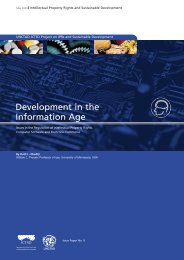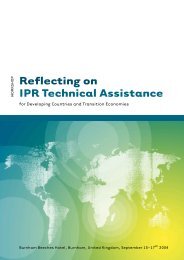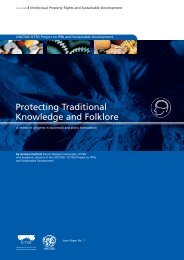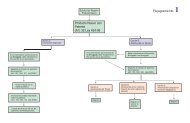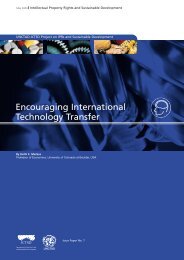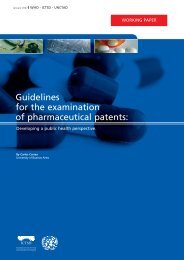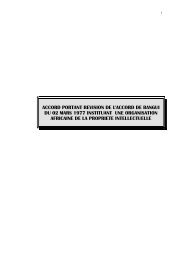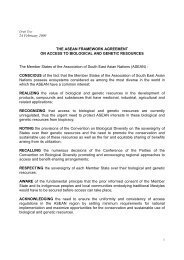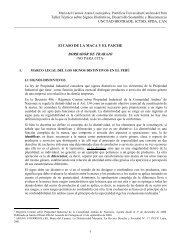Final Report of Uganda Intellectual Property ... - IPRsonline.org
Final Report of Uganda Intellectual Property ... - IPRsonline.org
Final Report of Uganda Intellectual Property ... - IPRsonline.org
Create successful ePaper yourself
Turn your PDF publications into a flip-book with our unique Google optimized e-Paper software.
ICTSD Programme on IPRs and Sustainable Development<br />
13<br />
4. IPR ADMINISTRATION<br />
Administration <strong>of</strong> IPRs covers a number <strong>of</strong><br />
different dimensions <strong>of</strong> institutional capacity,<br />
such as <strong>org</strong>anisational and management<br />
arrangements; staffing and human resource<br />
issues; and operating procedures and automation<br />
models. Moreover, depending on the nature and<br />
volumes <strong>of</strong> anticipated workloads, administration<br />
<strong>of</strong> patents, trademarks, copyright and other<br />
forms <strong>of</strong> IPRs may require different types<br />
<strong>of</strong> institutional capacity and present unique<br />
challenges for LDCs.<br />
The TRIPS Agreement sets out, inter alia, minimum<br />
standards for the concerning the availability,<br />
scope and use, enforcement and acquisition and<br />
maintenance <strong>of</strong> IPRs in WTO member countries.<br />
For example, Article 62 <strong>of</strong> the Agreement explicitly<br />
requires that national administrative procedures<br />
shall permit the granting or registration <strong>of</strong> the<br />
right within a reasonable period <strong>of</strong> time. At the<br />
same time, the administrative processes must<br />
ensure the balancing <strong>of</strong> national public interests<br />
with those <strong>of</strong> the rights holders.<br />
The administration <strong>of</strong> intellectual property rights<br />
involves receiving <strong>of</strong> applications, examination <strong>of</strong><br />
those applications as to formalities and substance,<br />
refusing or granting and registering and publishing<br />
the IPRs. As some IPRs (e.g. patents) expire after<br />
specified periods <strong>of</strong> time, further steps are<br />
required to complete renewal procedures. In<br />
the case <strong>of</strong> trademarks, for example, constantly<br />
increasing application rates and the possibility<br />
<strong>of</strong> virtually endless renewal cycles pose major<br />
demands on IP administration. Whilst all <strong>of</strong><br />
the procedures for efficient administration <strong>of</strong><br />
industrial property rights require properly trained<br />
staff and modern and automated information<br />
systems, by far the most challenging aspect is the<br />
substantive examination <strong>of</strong> patent applications.<br />
As patent applications rapidly evolve to cover<br />
highly technical subject matter in areas<br />
such as micro-electronics, pharmaceuticals,<br />
life forms and nano-technology, substantive<br />
examination requires increasingly higher levels<br />
<strong>of</strong> pr<strong>of</strong>essional/technical competence and access<br />
to sophisticated international patent information<br />
computer databases. Such institutional capacity<br />
requirements are well beyond the reach <strong>of</strong> most<br />
individual IPR administration agencies in the<br />
world. Most countries, including LDCs therefore<br />
opt for a patent registration regime that is based<br />
on a system <strong>of</strong> regional and/or international cooperation.<br />
4.1 Overview <strong>of</strong> Existing Situation<br />
4.1.1 <strong>Intellectual</strong> property (patents, trademarks, industrial design, utility models and<br />
copyright)<br />
The <strong>Uganda</strong> Registration Services Board (URSB)<br />
is a ‘corporate’ body that reports to Parliament<br />
through the Minister <strong>of</strong> Justice and Constitutional<br />
Affairs 11 , and is responsible for administering<br />
intellectual property rights, namely patents,<br />
trademarks, industrial designs and copyrights.<br />
At the same time, the URSB is also responsible<br />
for the registration <strong>of</strong> births, deaths, marriages<br />
and business registrations. In addition to the<br />
Registrar, the Bureau has a total complement <strong>of</strong><br />
5 State Attorneys who carry out the pr<strong>of</strong>essional<br />
functions relating to intellectual property matters<br />
among the 13 statutes that are administered. 12<br />
The equivalent <strong>of</strong> approximately 4 state attorneys<br />
and one search clerk are allocated to trademark<br />
operations. There are no technical examination<br />
resources in the Bureau to address substantive<br />
technical issues relating to patents or patent<br />
applications.<br />
The URSB currently operates a paper-based<br />
registry for industrial property rights and<br />
trademark searches are conducted manually<br />
rather than using an automated system.<br />
Information about industrial property rights


